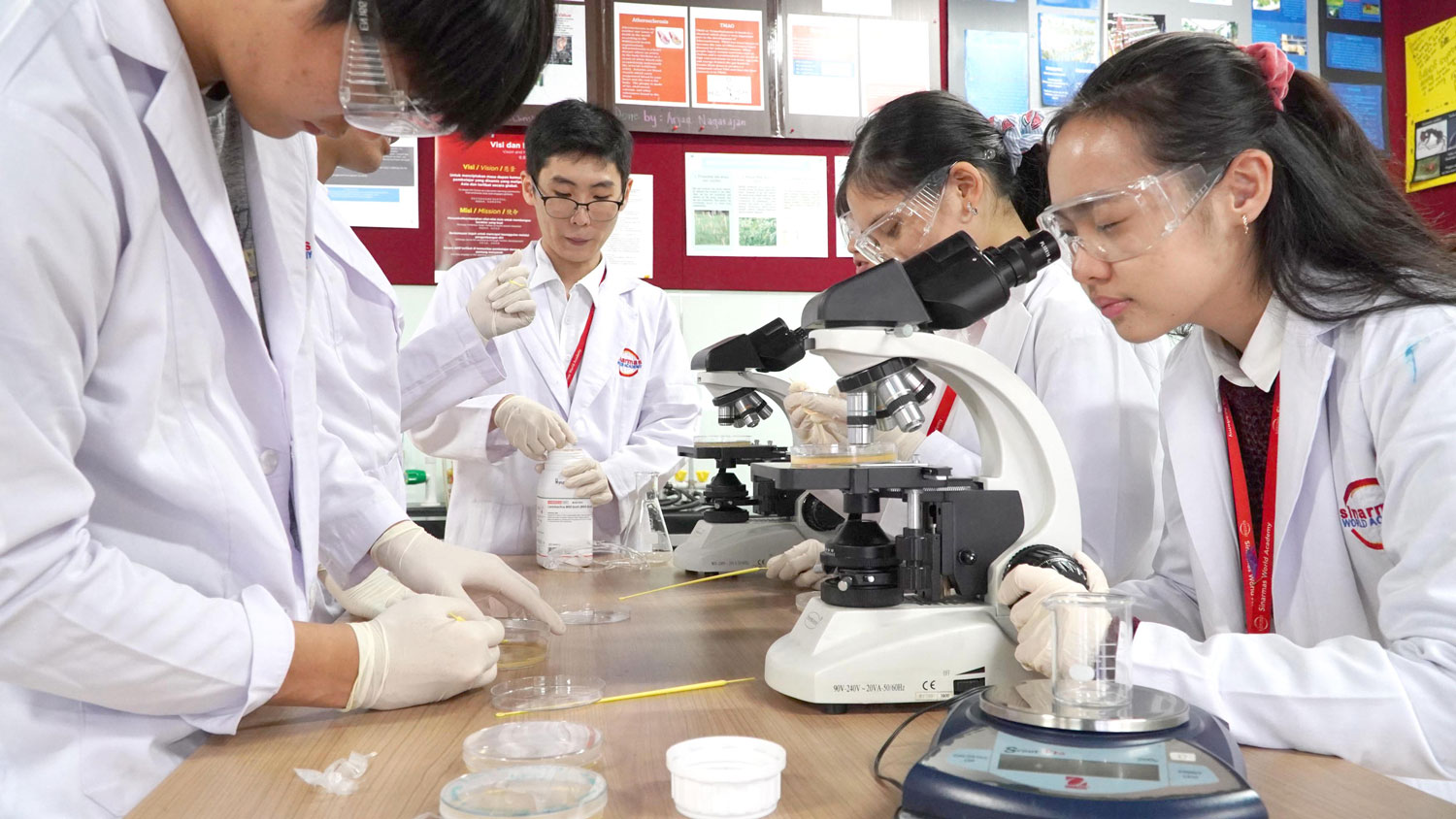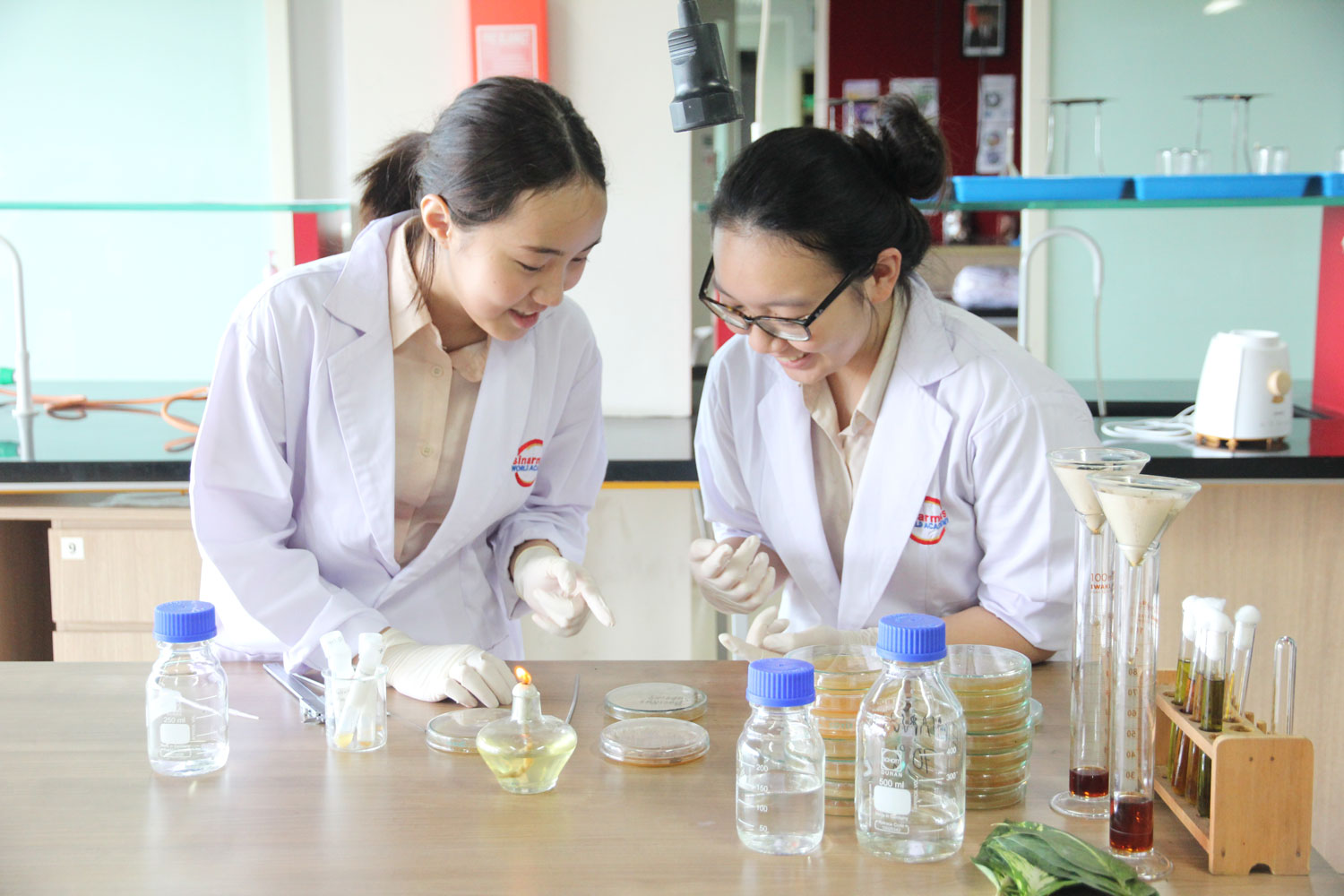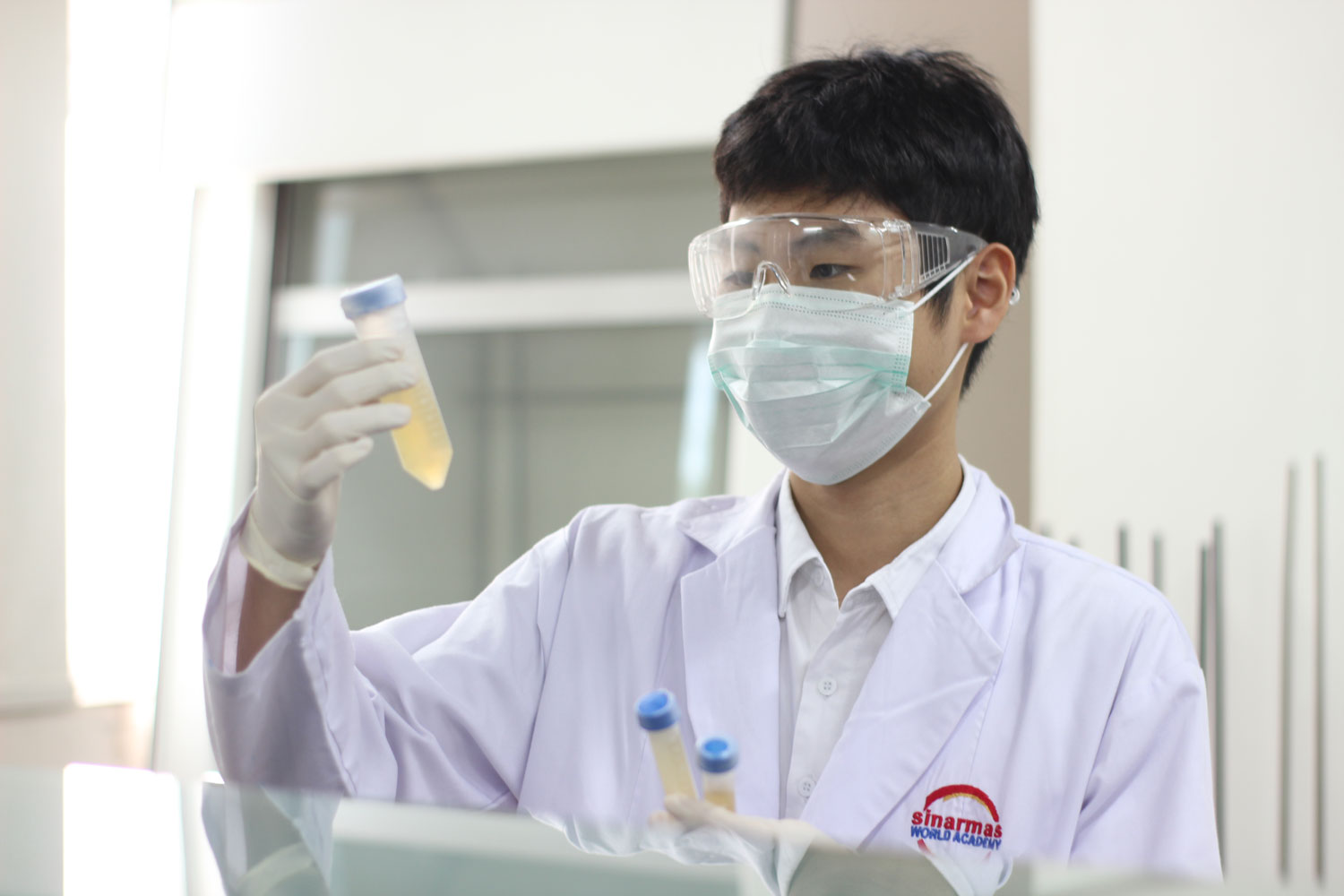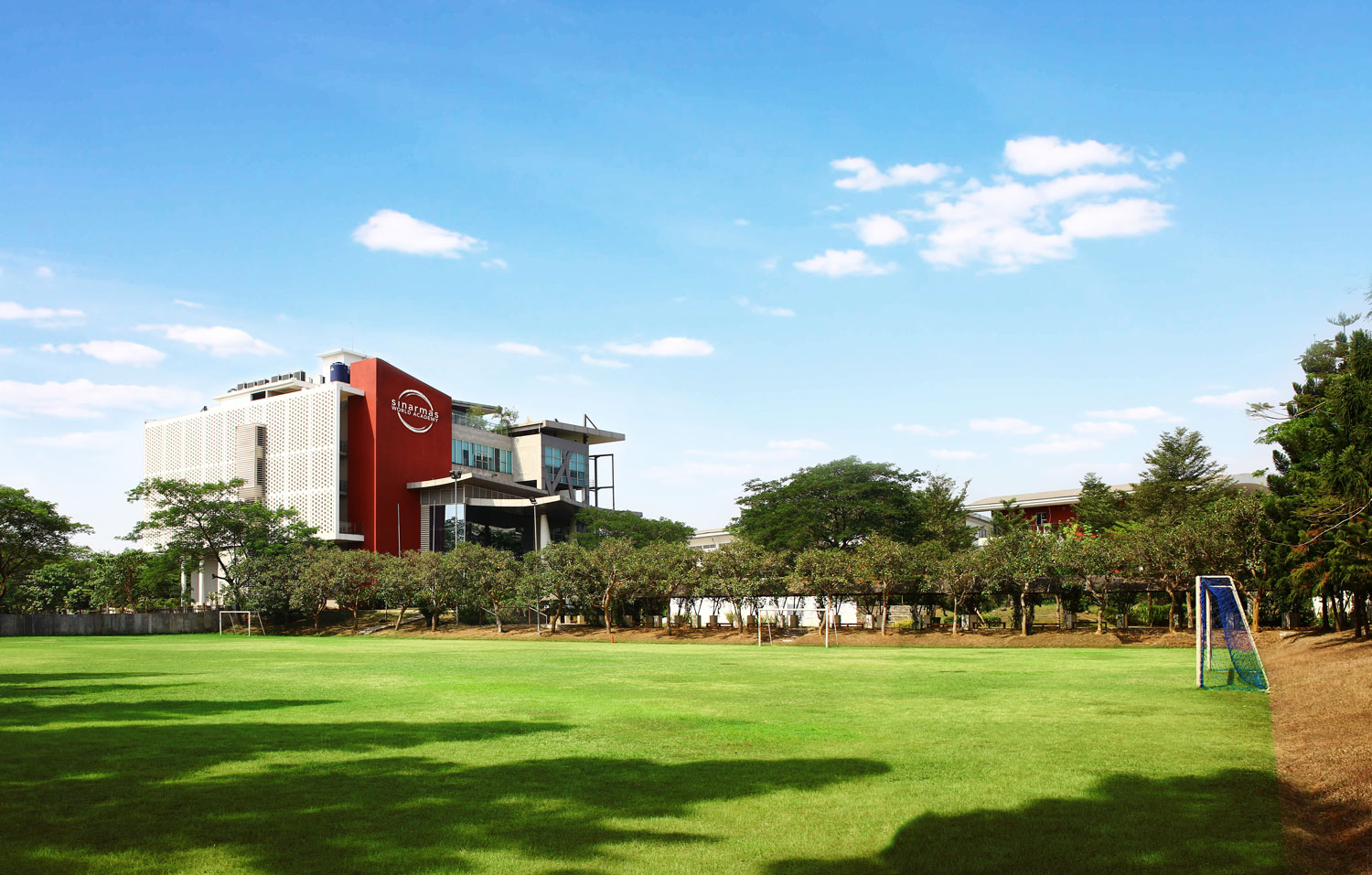Every Tuesday afternoon, more than 20 middle- and high-school students gather at the biology lab at Sinarmas World Academy (SWA). They brainstorm on their next bio-engineering projects, exploring plausible research ideas, and planning background research.
In a recent session, they divided themselves into three groups. They were on research projects they would have to carry out for the rest of the academic year. Among the topics on the table were bacterial cells capable of detecting early signs of a heart attack or bacterial cells that can make plastic decompose faster.
The students are members of the BioBuilder Club, an extracurricular group that focuses on the application of biological engineering. The club seeks to formulate a well-defined real-world problem and work on the possible solutions.
“I’d like everyone to work together on an idea that can change the world for the better,” said Audrey, the president of the club, who is in 11th grade. “I don’t want anyone to feel like they’re left out. I want everybody to work as a team.”
Last year, the club sought to find feasible ways to cure diabetes with genetic engineering, examining how genetically modified bacterial cells can produce human insulin. The students went on to publish their yearlong work project on BioTrek, an international platform for synthetic biology journals authored and reviewed by high school students, teachers and professors from prestigious universities.
The students who join the club usually have particular interests in biology. Hyun Seo, one of the members who did the research on insulin, is a case in point. He loves biology and is intrigued by the unique biological process of animals and plants, like photosynthesis.

The idea that bioengineering allows students to learn a distinctive ability of a certain species and adopt it into a life-saving tool for humans fascinates Hyun Seo. “That’s very interesting for me,” the 12th grader added.
When the club was established three years ago, there were only two high school students doing research on bioengineering. They have graduated from SWA but they still retain a sense of curiosity about biomedicine until now. One is pursuing a major in medicine in Hong Kong, and the other in pharmacy in Singapore.
Now the club has extended its reach beyond high school students, allowing inquisitive middle school students to join and learn together with their seniors. This, hopefully, will prompt the younger students to delve deeper into research works, while the high school students will learn to teach their middle school juniors so they can complete the research as a team.
SWA, a prestigious private international school in BSD City, seeks to ensure that its students will get the best facilities along the way, teaming up with the non-profit BioBuilder Educational Foundation, which provides lab kits and textbooks and world-class mentorship.
The club is closely supervised by the high school biology teacher, Hayden. Members can enjoy a valuable mentoring program from prestigious institutions. They can send the latest report of their research and get it reviewed by professors and scientists across the globe — either by way of correspondence via emails or virtual meetings.
They can also get to know and talk to other students of other bio builder clubs from different high schools in different countries. Such meetings usually take place via videoconference.

Among the precious lessons that students can take from the BioBuilder Club is how to master the skills for scientific investigations and build their confidence to complete a complicated research project.
All of these unique experiences can come true thanks to the partnership between SWA and the BioBuilder Educational Foundation.
The BioBuilder program aims to bridge foundational sciences — like biology, chemistry and physics — to the engineering of living systems, enabling students to apply their ideas to address local and global challenges.
"Through BioBuilder, students gain technical knowledge, learn lab techniques, practice research-based thinking and polish their professional skills. But just as importantly, they imagine and build the world as they want it to be,” said Natalie Kuldell, the founder of the foundation and lecturer at the biological engineering department at the Massachusetts Institute of Technology in the United States.
Many schools across the globe have created bio builder clubs in the past few years, allowing their students to have the opportunity to examine the living cells closely and explore the wonders of science in collaboration with their schoolmates and other friends from other schools in foreign countries.
“Watching the teams collaborate across time zones and international borders, just like the teams from Massachusetts and Jakarta, you can't help but think how creative and impactful these students will be," Kuldell added.
Sinarmas World Academy prides itself in its integrated and comprehensive curriculum, particularly when it comes to science, technology, engineering, arts and mathematics (STEAM).

Besides the BioBuilder Club, SWA offers a lot of extracurricular activities that help students develop their interests in science and technology. Among them are the Makers Club, where students make games out of the Arduino programming, and the Robotics Club, where students program robots made out of Lego pieces.
SWA has always highlighted the importance of the academic achievement and its connection to the real world. The extracurricular activities can leverage the interests and knowledge of the students in a way classroom lessons cannot.
“When a lesson is done inside the class, they tend to focus on grades but not so much on creativity. The extracurricular activities, on the other hand, is all about pushing the limits and pushing what they’re exposed to in the class,” said Hayden, the mentor of the bio builder club and the coordinator for extracurricular activities for middle school and high school at SWA.
“The students have full ownership over their projects, and they have the freedom to do what they want,” he added.
Earlier this year, SWA won the silver medal in the Best STEAM Initiative category at the annual EduTECH Asia Awards. This illustrates how the school aims to take its STEAM curriculum to the next level, creating interdisciplinary learning experiences by incorporating the subjects with problem-based learning methods.
The EduTECH Asia Awards, the largest education conference and exhibition in Asia, celebrate educators and recognize the inspirational stories in the education fields.
Balancing academic skills with real-life ones
SWA recognizes the importance of allowing students to pursue their own hobbies through various extracurricular activities to shape well-rounded, fully-functioning individuals, and these activities also need not be always science-focused: according to SWA General Manager Deddy Djaja Ria, SWA also has various arts clubs – comprising Peking opera, dance and music – as well as various athletics and sports clubs.
These clubs, hosted after the students finish their school periods, help individual students to delve deeper into their areas of interests, according to Deddy. “We also integrate physical education, the arts and music into the middle school and high school curriculum,” says Deddy.
Deddy said that these extracurricular activities are available from early education program to help students acquire the necessary emotional and social skills by relating with their fellow students from as young an age as possible.
Furthermore, the clubs help these students interact with their fellow students – and teachers – who are culturally different, polishing their English and other foreign language skills all the while. “More than 40 percent of SWA’s students are non-Indonesians, while about 70 percent of SWA’s faculty members are non-Indonesians and the school uses English as a medium of instruction,” says Deddy.
All activities in SWA are facilitated by teachers who have at least five years of experience teaching the subjects that they specialize in; the International Baccalaureate (IB) and Cambridge teachers have also been certified in their respective curriculum, while making sure that all language classes are taught by native speakers of the respective languages, according to Deddy.
SWA also collaborates with the Peking University Elementary School in Beijing, China, to get the best Mandarin teachers.
SWA also structures its education curriculum in adjustment with students’ lifespan development stages, according to Deddy. For the early years program (toddler to kindergarten 1), the school applies the Early Years Foundation Stage from the United Kingdom, equipping students with the broad range of knowledge and skills, as well as the inquisitive minds and curiosity they need, to serve as the right foundation for them to enter school.
For the elementary school years (from kindergarten 2 to grade 5), the school applies the Cambridge primary education combined with Chinese and national curricula. The Chinese curriculum is applied through consultancy with the Peking University. The program exposes students to basic disciplines: Maths, English, Sciences, Information/Computer Technology Studies and Programming, Mandarin, Robotics, Dance, Music and other subjects.
The school endeavors to give students a fine balance among natural and social sciences as well as the arts so that they can discover their own areas of interest, all the while emphasizing Cambridge’s strong approach in building students’ character and learning styles.
By the time students enter the Middle School program (grades six to eight), meanwhile, the school has started to apply the IB Middle Years program combined with the Cambridge Secondary program. Starting from grade six, students and their parents are invited to join a counseling session with the school’s faculty members to help them identify their own areas of interest.
SWA has a pathway called BESTA, short for Business, Engineering, Science, Technology and the Arts, a track which helps students create a sustainable project in their fields of interest. The school starts applying the IB curriculum in this phase to stimulate students’ creativity and freedom of expression.
Finally, for the High School years (grades nine to 12), the school applies IB Middle Years program combined with Cambridge IGCSE curriculum for grades 9 to 10, while for grades 11 to 12, the school will apply the IB Diploma program. At this stage, the curriculum will train students to devise their own personal projects, to become more confident and articulate in making presentations while being sharply aware of the current foreign affairs. A hyper-focus is placed on applying the lessons they have acquired to a real-world setting, with a focus on global citizenship and forward thinking mindset.
All in all, SWA’s academic and non-academic programs strive to create children who can function well in the world.
Open Day
Sinarmas World Academy
Every Weekday (Mon to Fri)
Time: From 8 a.m. to 4 p.m.
Saturday, Feb. 22, 2020
Time : From 9 a.m. to 12 p.m.
Venue: Sinarmas World Academy Jakarta - CBD Lot XV BSD City, Jl. TM Pahlawan Seribu, Tangerang Selatan
Contact SWA for more information
Call +62 21 5316 1400 | Whatsapp +62 877-8413-0489 | www.swa-jkt.com







